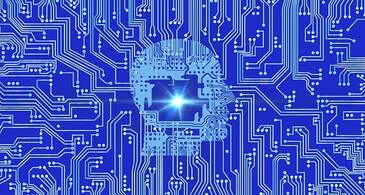 Artificial Intelligence. Or simply, AI. The darling of science fiction writers for many years, it has now firmly moved into the mainstream with the meteoric rise of ChatGPT, the chatbot app that many users tout means the end of Google. Ask it anything. It "allows you to chat and converse with a mind-blowing assistant using state-of-the-art language processing AI BOT," so says its developers. By the way, in case you were wondering, "GPT" stands for "generative pre-trained transformer." Better to stick with the initials. There are wildly divergent opinions on AI. Super-techie Elon Musk has said artificial intelligence is more dangerous than nukes and will doom Mankind. He is quoted in one story that it poses “a fundamental risk to the existence of human civilization.” Come on, Elon, don't sugarcoat it. The late Stephen Hawking agreed with Musk, while Facebook's Mark Zuckerberg reportedly sees those views as an overreaction. The worry, of course, is that AI will become so powerful, it will grow beyond man's ability to control it. Humans will, in effect, become irrelevant as machines evolve to pursue their own destinies. As mentioned, this has been fodder for Hollywood for some time. Go back and watch the 1964 film, "Fail Safe," when the President, played by Henry Fonda, has to make an impossible decision when a computer malfunction sends one of our bombers to nuke Moscow and can't be recalled. Or more recently, the AI-empowered robots of "Ex Machina," who turn on their human creators. Good or bad, there's no question it's a fascinating topic. I was especially intrigued with this recent story, published in Fast Company, entitled: "AI can explain the meaning of life and the answer will surprise you." It focuses on a new book, "What Makes Us Human: An Artificial Intelligence Answers Life’s Biggest Questions," written by Iain Thomas, poet and novelist, and Jasmine Wang, technologist and philosopher. When asked that really big question humans have asked themselves for millennia, AI came back with three answers. The first of those is love. Quoting from the authors: "Love is the meaning of everything. Love is the purpose behind our lives; the reason why we’re here. The AI came back to it again and again in many different ways." Second, "the idea that we should return to the present moment—that Heaven, Paradise, is found within this present moment. As soon as we start to leave it, and we start to dwell on the past or become anxious about the future, we begin to suffer." And third -- which "AI returned to again and again in a way that was perhaps much more prevalent than the other two" -- was connection, "that we are fundamentally connected to each other and to the universe around us." Three simple truths that great thinkers, poets, artists and religious leaders have espoused and recognized almost since we first asked that question of ourselves. The Beatles knew it: "All You Need is Love." Romeo and Juliet knew it. Love is the one emotion that gives us comfort in the face of a cold and indifferent universe. As musician Steve Winwood sings in "Higher Love:" "Think about it, there must be higher love Down in the heart or hidden in the stars above Without it, life is wasted time Look inside your heart, I'll look inside mine" Then the idea of living in the present. Carpe Diem. Make the most of every moment of your life. With time our most precious commodity, that one is hard to argue. Of course, physicists have a hard time of pinning down just what "present" means in the vast scheme of time. What exactly is that moment, sandwiched between what is past and what is future. Maybe that's another question for AI to answer. Lastly, the idea everything is connected. On small scales, it could be Kevin Bacon's six degrees of separation; on cosmic scales, it means we are truly one with the universe. Buddhists have known that for thousands of years. Dust off your copy of "Siddhartha" and give it another read. Just as we send robot spacecraft to report on hostile environments, maybe it's a good idea to dispatch AI down intellectual rabbit holes, even if, in the end, it validates what we already knew. As to whether AI will eventually rule supreme and end the world as we know it, only time will tell. Many would say Mankind is speeding us toward that already. Comments are closed.
|
AboutYes, I know it's spelled like "Jerry." No, I don't know why it's pronounced "Gary." Archives
May 2024
Categories |
- Home
- Cruise/Travel
- Gigi in the 561
- Blogs
- Video
-
Explore
- Snaps >
- Island Destinations
- October Odyssey >
- Pam - Traveling in Style
-
Road Trip!
>
- Road Trip! -- Tucumcari, New Mexico
- Road Trip! -- The Painted Desert
- Road Trip! - Sedona, Arizona
- Road Trip! - Sedona Wineries
- Road Trip! Tonto Natural Bridge State Park
- Road Trip! - Mogollon Rim
- Road Trip! - Verde Canyon Railroad
- Road Trip! - Jerome, Arizona
- Road Trip! - California
- Road Trip! - Palm Springs Celebrity Tour
- Road Trip! - Palm Springs Aerial Tramway
- Road Trip! - Festival in Palm Springs
- Road Trip! - Willcox, Arizona and Apple Annie's Orchard
- Road Trip! Willcox Wineries
- Road Trip! Chiricahua National Monument
- Road Trip! Tombstone, Arizona
- Tombstone, Part Two
- Road Trip! - Epilogue
-
Traveling With Joe
>
- Beartooth Highway
- North Cascades National Park
- A Visit to the Philippines
- Grand Canyon National Park
- Glacier National Park
- Yellowstone National Park
- Hiking in Bear Country
- Crater Lake National Park
- Albuquerque Balloon Fiesta
- The Kerrville Folk Festival
- Building Hope in the Rio Grande Valley
- Yellowstone Camping Tales
-
Unknown Yellowstone
>
- Unknown Yellowstone - Heart Lake
- Unknown Yellowstone - Summit Lake
- Unknown Yellowstone - Shoshone Lake
- Unknown Yellowstone - Grizzly Lake
- Unknown Yellowstone - Riddle Lake
- Unknown Yellowstone - Pelican Cone
- Unknown Yellowstone - Mt. Washburn
- Unknown Yellowstone - Specimen Ridge
- Unknown Yellowstone - Avalanche Peak
- Unknown Yellowstone - Divide Creek
- Contact
- Search
|
© COPYRIGHT 2024 ALL RIGHTS RESERVED.
|

 RSS Feed
RSS Feed
